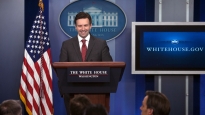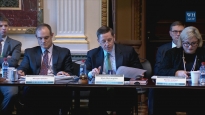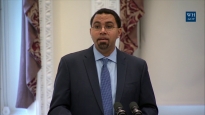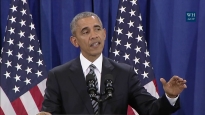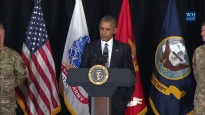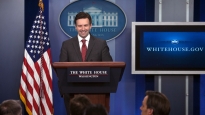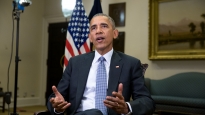President Obama Has Lunch with Teachers
July 07, 2014 | 4:34 | Public Domain
President Obama, joined by Secretary of Education Arne Duncan, hosts a group of teachers for lunch at the White House.
Remarks by the President before Lunch with Teachers
Blue Room
12:10 P.M. EDT
THE PRESIDENT: Well, good afternoon, everybody. I am here with some outstanding teachers as well as Secretary Arne Duncan. And the reason we’re here is with the school year now over, it is a great time for us to focus on what we need to do to make sure that next year and the year after that and the year after continues to improve for students all across this country.
The one ingredient that we know makes an enormous difference is a great teacher, and we have four of the best teachers in the country here. But what we also know is that there are outstanding teachers all across the country, and Arne, myself, I suspect many of you had wonderful teachers that made all the difference in your lives and allowed you to be excited about learning and set you on a path for an extraordinary career.
Unfortunately, there are a lot of kids around the country who are not getting the kind of teaching that they need -- not because there aren’t a whole lot of great potential teachers out there, but because we’re not doing enough to put a lot of our teachers in a position to succeed. They may not be getting the training they need, they may not be getting the professional development and support that they need in the classroom. And part of our goal since we came into office, since Arne became Secretary of Education is how do we continue to improve how teachers can get better each and every year.
Of particular concern is the fact that typically the least experienced teachers, the ones with the least support, often end up in the poorest schools. So we have a problem in which the kids who need the most skilled teachers are the least likely to get them. And the most talented and skilled teachers oftentimes are teaching the kids who are already the best prepared and have the most resources outside of the school in order to succeed.
So what we’re trying to do today -- and Arne is going to have more to say about this this afternoon because we’re hosting a bunch of other teachers who are here in town -- is to highlight what we’re calling “Excellent Educators for All.” It’s going to be a program in which we ask states to take a look at where they’re distributing great teachers, what are they doing in order to train and promote and place teachers in some of the toughest environments for children. And what we’re also going to be doing is providing technical assistance, highlighting best practices, all with the intention of making sure that wherever a child is, anywhere in the country, they’ve got that opportunity to have somebody in front of the classroom or beside them guiding them, mentoring them, helping them learn.
And when I think about my own experience, the only reason I’m here in the White House is because I had some extraordinary teachers as well as a pretty extraordinary mom and grandparents. I think everybody sitting around this table probably feels the same way -- I suspect that’s part of what inspired some of these people to become teachers. We want to make sure every child has that access to excellent teachers and we’re very confident that if we can lift up what works, that there are going to be a lot of states that want to adapt to it.
So, unfortunately right now, they don’t necessarily have the information and, as I said, if we do nothing, if we don’t highlight the problem, then inevitably the kids who probably need less help get the most, and the kids who need the most help are getting the least. That’s something that we’re going to need to reverse not just because it’s good for these kids -- we know that if they’ve got a great teacher, they’re more likely to graduate, they’re more likely to go to college, they’re more likely to succeed in their career -- it’s also necessary for our economy, because we’ve got too many kids who are trapped in situations in which they’re not able to realize their full potential.
So I want to thank all these folks for being here, and I’m really looking forward to listening to them to find out what they think can be most helpful in promoting excellence in teaching.
Thank you, everybody.
END
12:16 P.M. EDT
|
December 7, 2016
|
December 7, 2016
|
December 7, 2016
|
December 6, 2016
|
|
December 6, 2016
|
December 5, 2016
|
December 4, 2016
|
December 3, 2016
|
- &lsaquo previous
- …
- 3
- 4
- 5
- 6
- 7
- 8
- 9
- 10
- 11
- …
- next &rsaquo
